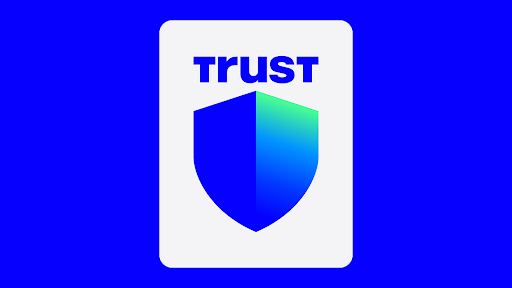Ever had that sinking feeling when you realize your crypto wallet might not be as secure as you thought? Yeah, me too. Something about handing over control of your digital assets to an app just feels… delicate. But then again, security in crypto isn’t just a checkbox—it’s an evolving beast. So when I first stumbled onto Trust Wallet, I was skeptical. Seriously? Another mobile crypto wallet promising the moon? But then I dug deeper.
Here’s the thing. Managing your crypto on mobile can be nerve-wracking, especially if you’re juggling multiple coins and want to stake some for passive gains. Trust Wallet somehow nails that balancing act between user-friendliness and robust security. It’s not perfect, but it’s one of the best I’ve tried.
Whoa! You can actually buy crypto right inside the app using your card. That blew my mind—no hopping between exchanges or sketchy third-party sites. Just a few taps, and boom, you’re in the game. My gut feeling said this could simplify onboarding for a lot of newbies.
Initially, I thought, “This must be complicated.” But no. The interface feels intuitive, even for folks who aren’t tech wizards. That said, I did notice some quirks that gave me pause (more on those later).
Security-wise, Trust Wallet is non-custodial, meaning you hold your private keys. That’s very very important because it puts control firmly in your hands. But, of course, that also means you’re responsible for backing up your seed phrase. Lose that, and you’re toast.
Okay, so check this out—staking crypto right from your phone is surprisingly seamless. Not all wallets manage this well. The process feels almost too easy, which made me suspicious at first. Is there a catch? Turns out, it’s just a matter of supporting the right protocols and networks, which Trust Wallet does pretty extensively.
On one hand, staking directly in the app encourages holding and earning rewards without fumbling through complicated steps. Though actually, I wish they offered more educational nudges about the risks involved. Some users might jump in without fully understanding lock-up periods or potential penalties.
Trust Wallet supports a wide array of tokens and blockchains, from Ethereum to Binance Smart Chain and beyond. That versatility is a huge plus if you’re like me and hold a diverse portfolio. Also, the fact that it’s open-source adds a layer of trust, because the community can audit the code.
Here’s what bugs me about many crypto wallets: they often feel clunky or overloaded with jargon. Trust Wallet strikes a good balance between advanced features and keeping things approachable. Though, sometimes the push notifications can be a bit much—like, chill with the alerts, please.
Really? You can even swap tokens within the app without needing to visit an exchange website. That’s a game-changer for people who want quick trades on the go. The integrated DEX (decentralized exchange) feature just makes the whole experience feel more cohesive.
Something felt off about the initial setup—specifically how it prompts for permissions. It’s a bit aggressive in asking for access, which can spook new users. But digging into their privacy policy shows they’re quite serious about data protection, so I guess it’s a trade-off for functionality.
Personally, I’m biased, but I think mobile wallets like Trust Wallet are the future of crypto management. When you’re out and about, having a secure, easy-to-use wallet that lets you buy, stake, and swap without fumbling through multiple apps is invaluable. It’s like having your crypto bank right in your pocket.
Check this out—staking rewards compound over time, and being able to monitor that growth directly on your phone keeps you engaged. It’s a subtle mental nudge that keeps you invested in the ecosystem.

Actually, wait—let me rephrase that. While Trust Wallet handles staking well, it’s essential to do your own research on the tokens you stake. The wallet facilitates the process, but it can’t shield you from market volatility or project risks. So yeah, caveat emptor.
Another thing I appreciate is the wallet’s support for decentralized apps (dApps). This opens up a world of possibilities without ever leaving the app, from gaming to DeFi protocols. It’s like having a crypto Swiss Army knife.
And the onboarding experience? Surprisingly slick. You can create a new wallet or import an existing one with a seed phrase in minutes. Plus, the backup reminders are persistent without being annoying. I’m not 100% sure if that’s all it takes for complete safety, but it’s a solid start.
On the flip side, the wallet’s reliance on your own device security means if your phone gets compromised, so does your crypto. That’s not unique to Trust Wallet, but it’s something I keep reminding myself. Multi-factor authentication options would be a welcome addition, though I get that mobile wallets have limitations.
Here’s a little tangent—oh, and by the way, if you’re someone who likes to keep their crypto on hardware wallets for cold storage, Trust Wallet still works well as a hot wallet companion. They complement each other rather than compete.
In my experience, using trust wallet made buying crypto with a card feel way less intimidating. The fees aren’t the lowest, but the convenience factor wins for me. Plus, the app is constantly updated, which shows the devs are on top of security and features.
So, what’s the takeaway here? Trust Wallet isn’t some magic bullet, but it hits many right notes for mobile crypto users who want to securely stash, stake, and buy crypto without jumping through hoops. If you’re comfortable with some personal responsibility and want a wallet that grows with your crypto journey, it’s definitely worth a shot.
Still, I’m left wondering how they’ll keep pace as the crypto landscape evolves. Will they introduce more advanced security layers? Or maybe better educational tools for newbies? Time will tell. But for now, it’s hands down one of the best wallets I’ve had on my phone.